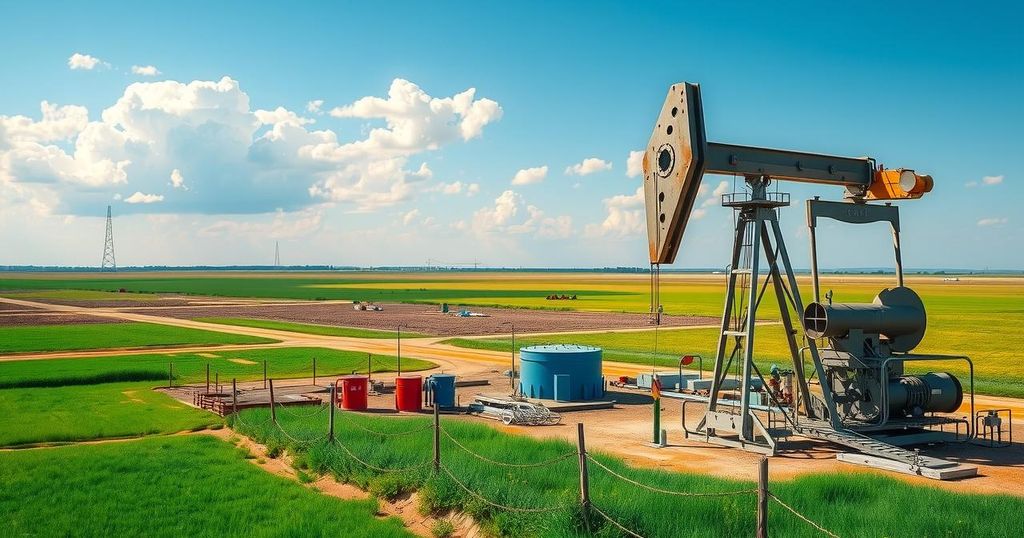Global news
AP, AP NEWS, ASIA, CASPIAN PIPELINE CONSORTIUM, CHEVRON CORP, COM, CPC, CVX, ENI S. P, ENI S. P. A, EU, EUROPE, EUROPE/ASIA, GEOPOLITICS, INTERNATIONAL RELATIONS, KAVKAZSKAYA, KAZAKHSTAN, NY, OPEC, PUTIN, ROSSIYA, RUSSIA, RUSSIA-UKRAINE WAR, SANCTIONS, SHEL, SHELL PLC, TRUMP, U. S, UKRAINE, VLADIMIR CHIZHOV, VLADIMIR PUTIN, VOL, WAR
Leila Ramsay
0 Comments
Kazakhstan Faces Energy Crisis Amid Trump-Putin Tensions
The Trump administration is mediating a peace deal between Russia and Ukraine; however, Kazakhstan is facing significant challenges due to drone attacks on the CPC oil depot. The CPC is vital to its oil exports, but production efforts are complicated by OPEC+ quotas. Analysts suggest that despite disruptions, the global oil market may experience demand exceeding supply in the coming months.
In recent weeks, the Trump administration has endeavored to facilitate a peace agreement between Russia and Ukraine, potentially signaling an end to the protracted conflict. Despite these peace efforts, Kazakhstan has found itself adversely affected amid rising tensions, as evidenced by targeted drone strikes that damaged the Kavkazskaya oil depot, crucial to the Caspian Pipeline Consortium (CPC).
The CPC, which serves as a key export channel for Kazakhstan and represents approximately 1% of global oil supply, has faced significant disruptions. Following the attack on the Kavkazskaya depot, it was reported that the CPC’s delivery capacity had been reduced by 40%, severely impacting the flow of oil that was previously sustaining exports.
Kazakh journalist Oleg Chervinsky noted that the CPC had been included in Trump’s ceasefire agreement, suggesting that the recent drone strikes violated this moratorium. However, ambiguity remains as both Russia and Ukraine level accusations of failing to comply with ceasefire terms.
Reportedly, Trump is displeased with President Putin for undermining Ukrainian President Zelensky, further complicating diplomatic relations. Trump has even threatened to impose substantial tariffs on Russian oil exports, marking a notable shift in his stance towards both nations.
The conflict’s repercussions extend to Kazakhstan’s economy, particularly its energy sector. In light of escalating tensions, the CPC’s dividends have been vital for Kazakhstan’s state budget and its national oil company, KazMunayGas. Kazakhstan aims to increase oil production to address its budget deficit, amidst rising output figures, which reached record highs recently.
Kazakhstan’s increase in oil production is largely attributed to the expansion efforts at the Tengiz oilfield, notably led by Chevron. With ambitions to diversify exports beyond Russia, Kazakhstan’s Energy Minister has revealed plans to significantly increase exports through the BTC pipeline.
However, Kazakhstan faces challenges in adhering to OPEC+ quotas, as current production levels exceed official limits. Together with other producing nations, Kazakhstan will need to provide compensation for overproduction through 2025.
Fortunately, analysts from Standard Chartered have observed that fears of a supply surplus have not materialized, predicting sustained demand exceeding supply through the upcoming quarters. This analysis provides a cautiously optimistic outlook for Kazakhstan’s energy production amidst geopolitical turmoil.
The ongoing conflict involving Russia and Ukraine greatly impacts Kazakhstan, particularly its energy sector. Drone strikes on critical infrastructure have disrupted oil exports, jeopardizing Kazakhstan’s economic stability amidst increased production efforts. Despite these challenges, the nation’s plans to diversify its export routes and the positive market outlook may provide some resilience. However, adherence to OPEC+ quotas remains a concern moving forward, necessitating careful management of production levels to fulfill international obligations.
Original Source: oilprice.com




Post Comment